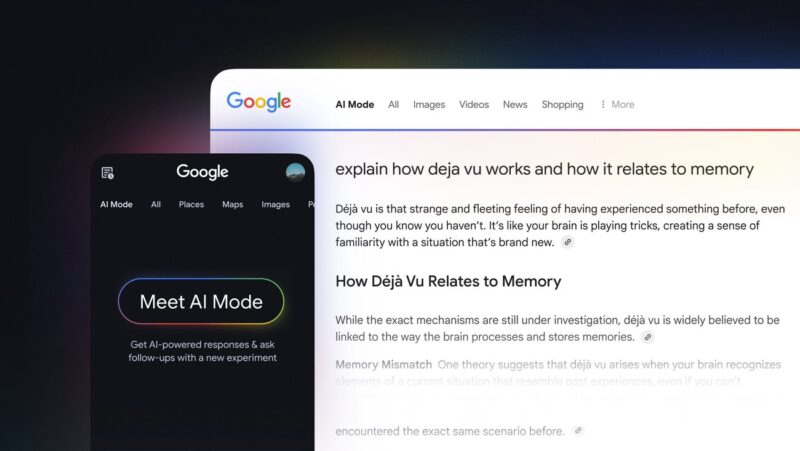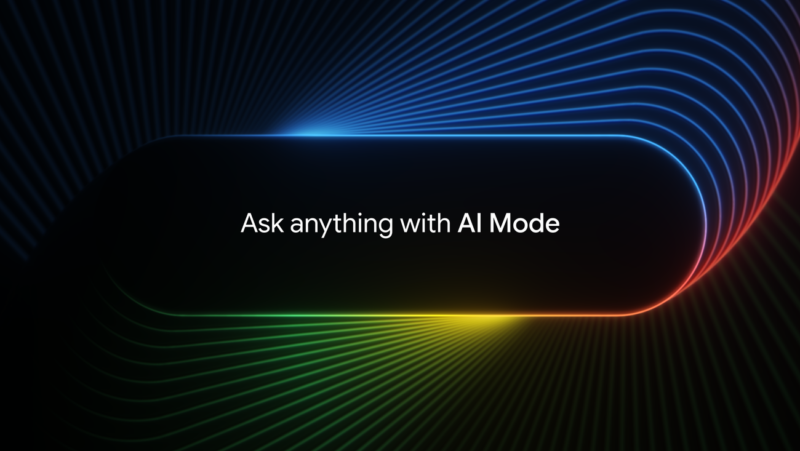
Is AI Mode the Future of Internet Search?
Google search is undergoing a revolution before our very eyes. This isn't merely another algorithm update, but rather a fundamental shift in how Google understands, organises, and presents information, all under the auspices of artificial intelligence. Google is transforming at this very moment, and soon it will no longer function solely as a search engine providing links, but as an intelligent system delivering comprehensive and in-depth answers.
At the heart of this transformation stand two new concepts: AI Mode, Google's new search interface that presents information summaries directly on the results page, and GEO (Generative Engine Optimisation), a novel approach to content creation tailored for AI-powered search engines.
If you're asking yourselves, "Will AI Mode affect me, and is organic promotion dead?" The short answer is no, SEO isn't dead. However, it requires adaptation to an era where the algorithm doesn't merely search, but also thinks.
Google Search Is No Longer the Same - But the User Still Is!
Whilst Google is indeed changing, the user remains with the same questions: where? how? what's best? what's advisable? When these questions meet a new search system based on artificial intelligence, the result is not only a faster answer, but a profound shift in how we approach knowledge.
We've written extensively about AI Overview in another article, so we'll touch on it less in this piece, but we will highlight the key points.

So what has changed?
If Google used to simply return a list of links, today it formulates the complete answer for us. Through a new interface called AI Mode, the search engine produces a summary of information from various sources, answers the question directly, and provides options for follow-up questions, rather like having a conversation with a person. In effect, instead of us searching for the answer, it comes to us.
And what hasn't changed?
- User intent has remained as it was: to find information, solve a problem, make a decision.
- Users' expectations for speed and accuracy have only strengthened.
- The need for reliability - whilst Google summarises, users still want to know where the information originated.
What is AI Mode and How Does It Work?
AI Mode represents the most significant change to Google's search interface since its inception. It doesn't merely alter how search results are presented, but transforms the very role of the results page itself.
So what exactly is AI Mode?
Put simply, it's a new display of search results where Google doesn't return a list of links, but rather a direct and interactive summary of the answer. The summary is generated using Google's artificial intelligence model, Gemini, and is based on content found across the web.
Here's how it works in practice:
- Say you searched for "how to register for VAT exemption?". Instead of receiving a list of links to articles on the topic, you'd get a summary paragraph, a list of steps, and sometimes even a table or graph.
- You can then add a follow-up question such as "what are the costs?" and receive an immediate answer without conducting a new search.

How Does AI Mode Work Behind the Scenes?
AI Mode is based on three core elements:
- Artificial intelligence-based conversational model (Gemini) - understands the question and extracts relevant information.
- Semantic search - doesn't merely search for words, but attempts to understand their meaning.
- Verification layer - the summary includes references to sources from which the information was taken, enabling users to check the source themselves.
What are the advantages of AI Mode for users?
- Rapid answers - no need to read three articles to understand the gist.
- Continuous conversation - one can delve deeper into the topic with follow-up questions.
- Accessible interface - the summary is accompanied by images, tables, and sometimes videos.
What are the challenges from an organic promotion perspective?
- Fewer clicks - users receive the answer without entering the website.
- Information not always accurate or current - the model can err or present partial information.
- Impact on smaller websites - which already struggle to stand out against stronger sites.
What is GEO and How Does It Change Everything We Thought About SEO?
We all know that SEO is search engine optimisation, but AI brings with it a new concept - GEO (Generative Engine Optimisation), which is essentially website optimisation for artificial intelligence. This means we're no longer merely trying to get Google to display us in results, but to get it to summarise and present our article as the source from which the answer was generated.

So what exactly is GEO?
GEO is a collection of techniques aimed at adapting content to generative artificial intelligence engines such as Google's Gemini or OpenAI's GPT. Instead of writing for users, we write so that artificial intelligence will understand, summarise, and favour us over competitors.
The Main Differences Between SEO and GEO
SEO | GEO |
Focuses on keywords | Focuses on context, answering questions, and semantics |
Built on links, hierarchy and text | Built on clear, accessible content that's easy to process |
Designed to display the site on Google | Designed to make Google summarise the content |
Writes for users | Writes for artificial intelligence as well |
It's important to understand that GEO doesn't eliminate the need for organic promotion, but rather expands it. The classic search engine still exists, but in parallel, a new search layer is developing, and that requires a different strategy.
Three main directions expected to expand:
- AI replaces simple searches - Questions such as "what is GEO?" or "how do you cook rice?" will no longer lead to links, but to rapid generative answers. This means websites must provide unique value, not just basic facts.
- Business promotion will require a new content structure - For Google to "extract" information from your website, content must be clear, reliable, structured in questions and answers—and crucially, it must answer precisely what users are searching for.
- More opportunities for small businesses - Previously, large brands dominated the first page. Now, even a small website with excellent content can receive a place of honour in Google's answer if it provides quality and current responses.
Why is this good news?
- There's no need for enormous budgets, but rather an understanding of how to write proper content.
- You can succeed even without thousands of external links if you provide genuine value.
- If you're amongst the first in the country to understand the new game—Google will choose you when it launches in Hebrew.
Whilst the discourse surrounding AI Mode and GEO focuses primarily on technology and algorithmic changes, it's worth noting the truly significant shift - the new role of the content writer. If previously their role was to persuade users to click, today they must generate information good enough for Google to present it.
This means responsibility for answer quality no longer rests solely with the search engine, but with the creator. This presents an opportunity for those willing to invest in creating content that genuinely contributes to understanding reality.
Want to ensure your content is ready for Google's AI era? Let's build together a content strategy that speaks both to users and to the engine that summarises answers for them. Speak with us at Alt and we'll be delighted to tailor a smart, current, and results-based content solution for you.
Asaf Shimoni
Founder of Alt Digital Marketing, with nearly 20 years of experience in digital marketing. An expert in SEO and paid campaigns, helping tech companies, eCommerce, and B2B businesses achieve steady growth through tailored marketing strategies.

REQUEST A WEBSITE CHECK
See how your website could be performing better.
